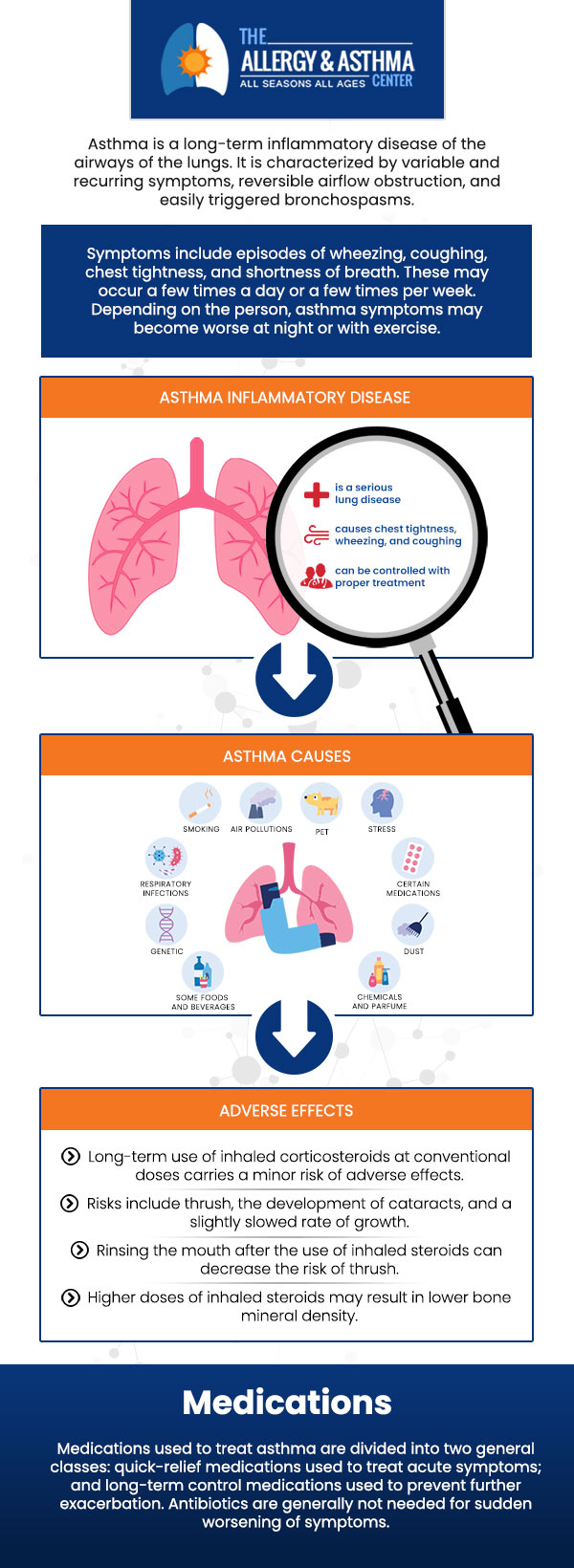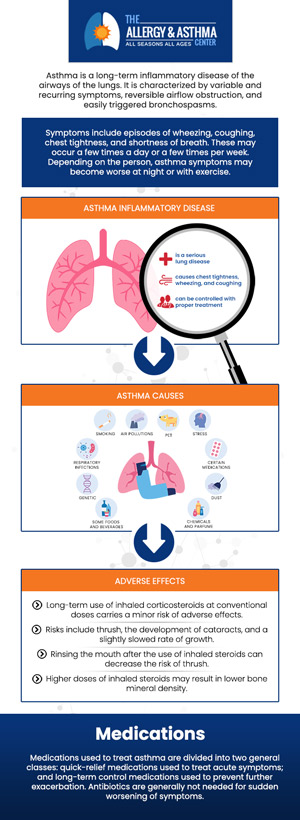Helpful Questions to Ask Your Asthma Specialist
Asthma can range from mild to severe, but don’t worry! Treatment is available. Contact our team of healthcare professionals today at The Allergy & Asthma Center and let us help treat your asthma. For more information, contact us or book an appointment online. We have 3 convenient locations to serve you in Lawrenceville GA, Atlanta GA and Conyers GA.




Table of Contents:
What is asthma?
What are the causes of asthma?
What kinds of tests will I need to monitor my asthma?
What are the 3 types of asthma?
Asthma is a condition that affects your airways, causing them to narrow and swell. This can lead to difficulty breathing, wheezing, coughing and shortness of breath. Asthma can range from mild cases that are a nuisance to sufferers, to severe cases that can interfere with a person’s day to day activities and could be potentially life-threatening when sufferers have an asthma attack. Asthma symptoms will vary from one person to the next, with the frequency and severity of the symptoms also being unique to each individual case. Some people who suffer from asthma may have symptoms all the time, while others may have them at certain times only, like during exercise, or the asthma attacks can be infrequent. Signs and symptoms of asthma include chest tightness or pain, shortness of breath, wheezing when breathing out, attacks of coughing and wheezing made worse by a respiratory virus and coughing, wheezing or shortness of breath that causes the individual to have trouble sleeping. Over time, asthma can get worse in sufferers, with the signs and symptoms becoming more frequent or bothersome, breathing becoming increasingly difficult, and having to use an inhaler for relief more frequently. There is no cure for asthma, but the symptoms can be controlled with the help of your doctor.
The exact cause of asthma is unknown, although it is suspected to be mostly due to genetics or environmental factors. Asthmatic symptoms can be triggered by allergens such as dust mites, pollen, molds, and animal dander. They can also be triggered by environmental and air pollutants such as cigarette smoke, chemical pollutants, and even cold air. Asthma symptoms can also come on as a response to physical exercise and extreme emotional response, as well as about sinusitis or from some medications like aspirin, NSAIDs, or beta-blockers. In some cases, asthma attacks have been shown to be triggered or exacerbated by gastroesophageal reflux disease. Dietary insufficiencies are also thought to be factors in such nutrients as vitamins C and E, as well as omega-3 fatty acids. While there is no direct cause, some factors related to early childhood have been linked to the development of asthma such as poor maternal nutrition, motherhood at a young age, lack of breastfeeding, premature birth, and low birth weight.
There are four types of tests that can be used to monitor asthma in individuals who suffer from it. The first is the peak flow test which is used to measure the total capacity of your lungs. To complete the test, you will need a peak flow meter, which you will close your lips around and then forcefully exhale into it. The device will indicate what your peak flow rating is with a higher rating indicating a higher lung capacity. By consistently using a peak flow test you will understand what your normal lung capacity is and can use it to indicate if your lung capacity is dropping close to your danger zone. The next test is a FeNO test, which stands for fractional exhaled nitric oxide. This test can be used for your initial asthma diagnosis as it measures the amount of nitric oxide found in each breath. The level of nitric oxide identifies the presence of inflammation in your airways, which will indicate whether or not you are suffering from asthma. FeNO tests can be used to identify what type of asthma you have as well as for monitoring if you are experiencing setbacks or improvements in the condition of your lungs. Similar to allergy testing, provocation is the third type of test and works by exposing the individual to allergens that can cause asthma to flare up or having them perform a physical activity that puts them under mild stress. This will indicate not only if asthma is an issue but will help identify what the triggers for asthma symptoms are at the same time. The final test is spirometry which measures how much air you can exhale in the span of one second as opposed to the total used in a peak flow test. Using a spirometer compares the stats of your one-second exhalation to other people with the same details as you such as sex, age, and size. Using it consistently will show how your percentage varies when exposed to different triggers and how your lung health fluctuates from day to day.
Asthma can be classified into 3 different buckets so named and classified by the triggers that bring on asthma symptoms. They are nocturnal asthma, exercise-induced asthma and allergic asthma. As its name suggests, nocturnal asthma symptoms flare up at night and individuals suffering from nocturnal asthma may find themselves waking up with chest pain, coughing and wheezing. This could be due to increase allergen exposure, a reclining position, the airways cooling or potentially hormone cycles. Exercise-induced asthma is brought on by the exertion of physical activity such as exercise or participation in sports. Symptoms typically begin within a few minutes of starting exercise, with patients experiencing difficulty breathing, coughing and wheezing. Once the individual has stopped their exercise, the symptoms will reach their peak of severity and an asthma inhaler usually works to relieve symptoms. The final type of asthma is allergic or seasonal asthma that is induced from exposure to allergens that are inhaled into the system, such as pollen, mold, pet dander or dust mites. The allergen could also be something in the individual’s work environment such as paint, gas, or metal or could be linked to drugs such as aspirin.
If you have more questions about asthma and our services, visit The Allergy & Asthma Center and talk to our medical professionals. Feel free to contact us for more information or book an appointment. We serve patients from Lawrenceville GA, Atlanta GA, Conyers GA, Suwanee GA, Duluth GA, Grayson GA, Decatur GA, Brookhaven GA, Lithonia GA and Covington GA.

Additional Allergy & Asthma Services
▸ Allergy Shots
▸ Allergy Testing
▸ Asthma
▸ Bronchodilators
▸ Drug Allergy
▸ Food Allergy
▸ Insect Allergy
▸ Nasal/Sinus Allergies
▸ Pediatric Allergy
▸ Pediatric Asthma
▸ Skin Allergy
▸ Spring Allergies




